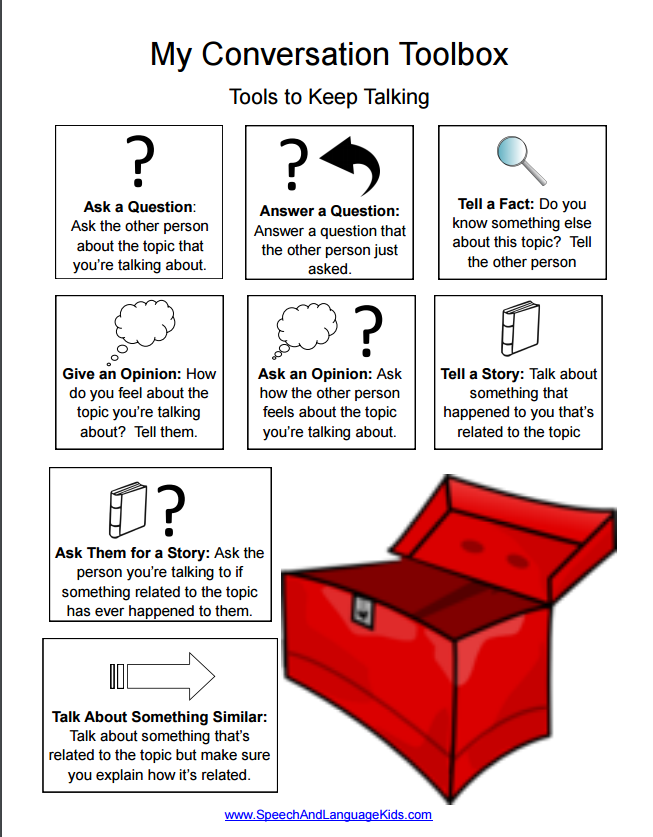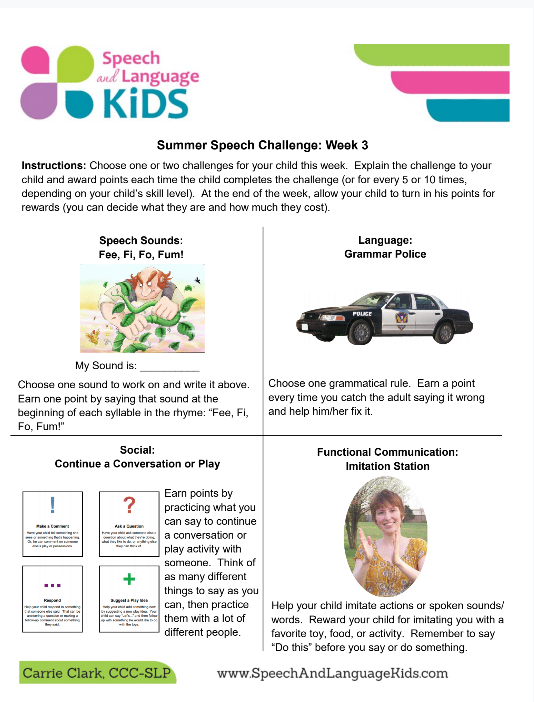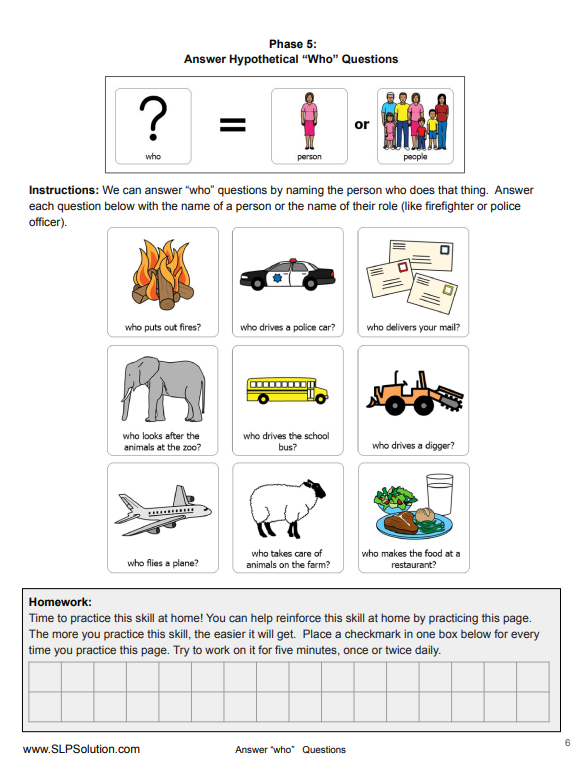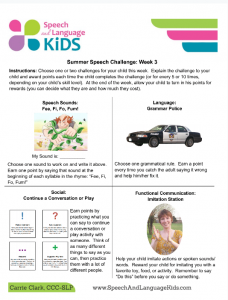Summer Speech Therapy Homework – Week 3
Welcome to week three of our Summer Speech Challenge for Parents! Click here if you want to go back and start from week 1!
Summer Speech Therapy Homework Challenge:
To recap, our Summer Speech Challenge is a new challenge for your child each week of this summer. These are simple activities that are meant for you to be able to work into your daily routines. There are four different challenges each week so you can pick which one is best for your child. If you feel like your child struggled with last week’s and you’d like to try it for another week, go for it! Or, you can push ahead and do this week’s activity anyway. Sometimes our children do better if we switch to something else.
Avoid the Battle:
I want to make a quick note here that nothing we’re doing here should be a battle! If your child is struggling to do the skill that you’ve selected, try to either make it easier or switch to something else. The reason that we speech-language pathologists go to school for 5+ years is so that we can know exactly how to tweak things when the child isn’t getting it. So don’t feel bad if it’s just not clicking for you and your child! Switch to something a little easier to keep the momentum going to and check in with your child’s speech-language pathologist. This shouldn’t replace the advice of a licensed speech-language pathologist!
Choose an Area:
You’ll want to pick one or two challenges for your child to work on this week. Here’s a quick breakdown of the 4 areas that are included in our summer challenge so you can pick which skills your child needs.
- Speech Sounds: Choose this area if your child is struggling to say a sound correctly in conversation. You’ll only choose one sound to work on at a time so don’t go crazy! You can always come back and repeat this process with another sound later.
- Language: Choose this area if your child struggles with any parts of language. This can include anything from using full, grammatically-correct sentences to knowing the names for different vocabulary words. If it has to do with putting together sentences and getting your ideas across using words, then language is your area.
- Social Skills: Choose this area if your child needs help with interacting appropriately with others. We’ll practice a variety of interaction skills with this area.
- Functional Communication: Choose this area if your child is just beginning to talk or is only saying 1-2 words at a time. This area will focus on basic communication skills for our non-verbal children and new talkers.
Challenge Week 3:
Let’s get started with this week’s challenge!
- Choose one (or max two) areas below that your child needs to work on
- Print out the visuals for the challenges and cut out the ones your child needs
- Post the visuals somewhere that you and your child will see it frequently
- Read the challenge rules and explain it to your child in language she will understand
- Award points as your child completes the challenge throughout the week (view week 1 for ideas for this)
- Allow your child to redeem points as you see fit
Week 3 Picture Download:
Click Here to Download the PDF
The Challenges:
Speech Sounds: Fee, Fi, Fo, Fum!
For the speech summer challenges, you’ll want to choose one sound to work on. It gets complicated when you start adding in multiple sounds so just choose one that your child needs to work on. It can be one he’s already been working on in speech or an entirely new one.
Last week, you practiced having your child say the sound in isolation. If that has been going well, you can move on to this week’s challenge, which is to say the sound in nonsense syllables. If your child was not able to successfully say the sound last week by itself, you shouldn’t move on to this step. Either stay on the last step for another week or switch to a different sound and try that one in isolation.
For this week’s challenge, your child gets a challenge point for saying their sound at the beginning of nonsense syllables like “fee, fi, fo,” etc. I love using the “Fee, fi, fo, fum” rhyme because it’s fun. But you can actually have your child say any nonsense syllables at all. Simply have your child replace the /f/ in this rhyme with their target sound. If your child is having trouble with this, just try having them say “fuh” (with their target sound) for a while first and work your way up to other vowels. I find that “uh” is usually the easiest sound to pair with a new consonant. But you can try some other ones to find the easiest sound pair for your child.
Why This Helps: Now that your child can say the sound by itself, we need to start pairing it with other sounds. If we jump straight to words, your child will most likely still use the old sound, because that’s what she’s used to. But if we start with non-sense syllables, she’s likely to have better luck! Practice at this level for a while to help your child’s brain build new pathways for how this sound is created with a variety of vowels.
Language: Grammar Police
Many children with language delays struggle with some aspect of grammar. For this week’s challenge, choose one particular grammar problem that your child has and ask your child to be the grammar police for YOU when YOU say it incorrectly. Of course, first you’ll have to teach your child the rule.
For example, if your child always says “her” instead of “she”, you can explain to your child that when we’re talking about what a girl is doing, we say “she”. Then, ask your child to be the grammar police and catch you whenever you say “her” instead of “she”.
Next, you’ll want to purposely say it wrong so your child can catch you. In this example, you’d say “her is running!” and then pause to see if your child catches it. She most likely won’t catch it at first, since that’s what she’s used to saying. In the beginning, you’ll have to help her catch you. Say something like “Oops! I think we need the grammar police! I said ‘her is running’ instead of ‘SHE is running’. Can you help me fix it?”. Give her a point for helping you fix it and also for catching you if she starts to do that as well.
Why This Helps: Often our children don’t catch their own grammatical errors because they aren’t listening for them. If we can start them off by listening to the errors in our own speech, they can increase their awareness without having to nag them about what they’re saying all day long. Hopefully, your child will begin to hear the errors in her own speech after listening for it in yours.
Social Skills: Continuing a Conversation or Play
Last week we helped your child understand how to join a conversation or play that is already happening. This week, we’re going to talk about how to continue that conversation or play once it has started.
Help your child come up with a few different ideas of what he could say to continue a conversation or play once it has started. The specific suggestions will change depending on your child’s age and language skills. For younger children or children who aren’t speaking as much yet, you may want to just give them two options: to make a comment or ask a question. You can give your child specific examples, like “I like your ____” or “what’s that?”
If your child is older, you can start to introduce other ideas that may help continue the conversation. Here are some of the strategies that we give older children to use:

For this challenge, give your child a challenge point every time they practice one of these conversational skills with you, another familiar adult, or with a peer. You can start off by having them practice at home with you, and then work toward using these skills in actual conversations with other children, such as at the park or a community event.
Why This Helps: Joining a conversation is just half of the battle. Your child must also know how to continue that conversation once it has started. These tools will help your child become a better conversational partner and make it easier to get and keep friends.
Functional Communication: Imitation Station
Choo Choo!! All aboard the imitation station! For this challenge, we want to reward your child for imitating something that you do or say. We REALLY want your child to imitate something you say, but sometimes that’s not easy to get our children to speak. So if your child can’t imitate speech or sounds, we’ll have him imitate actions that we do with our body.
Find something that your child is highly motivated by. This can be a favorite food, toy, or activity. Tell your child that he can have that thing after he does what you do.
Next, say “Do this”, then do something. Choose from the list below. The ones at the top of the list are the hardest but are also the most helpful for your child learning to imitate speech and language. So try those first. If your child can’t do those, move farther down the list until you find something your child CAN do and work at that level for a while. Reinforce your child for imitating you by giving him the food, toy, or activity that he wants. If your child doesn’t imitate you at all, choose something from the bottom of the list and physically help your child to do it by moving his body parts after you say “do this” and do the action. Again, don’t make this a battle. If he’s not ready for this activity, try again tomorrow!
List of Tasks (Hardest at the top):
- Imitate a word or phrase
- Imitate a specific sound by itself (like “buh”)
- Imitate a sound effect with your mouth (like blowing a raspberry or making a motor sound)
- Imitate an action with your mouth (like touching your lips or sticking out your tonuge)
- Imitate a hand movement (like waving or clapping)
- Imitate a whole body movement (like sitting down or jumping)
Keep practicing different types of imitations throughout the week and see if you can move up the list toward the harder ones.
Why This Helps: In order for our children to make progress in speech therapy, we need them to be able to imitate the things we say. But some children need to practice just imitating movements first. The better your child is at imitation, the faster he’ll be able to make progress in speech therapy!
Recap:
Ok, you should have your challenge(s) by now. Here’s a recap of what you need to do:
- Print out the pictures for this week’s challenges and cut out the ones you need (see button below)
- Post the challenge picture on the wall and explain the challenge to your child
- Award points throughout the week whenever your child completes the challenge
- Encourage your child to practice and earn points as often as possible

About the Author: Carrie Clark, MA CCC-SLP
Hi, I’m Carrie! I’m a speech-language pathologist from Columbia, Missouri, USA. I’ve worked with children and teenagers of all ages in schools, preschools, and even my own private practice. I love digging through the research on speech and language topics and breaking it down into step-by-step plans for my followers. I graduated from Truman State University in Kirksville, MO with a masters degree in Communication Disorders.
Connect with Me:






Hi
My son is 8 year’s old
Having difficulties in recall the stories,
Language ,he usually avoid using adjectives.
And social communication problem.
Thank you.
Hi, Harshit-Please check out these resources on Carrie’s site: https://www.speechandlanguagekids.com/?s=recall, https://www.speechandlanguagekids.com/?s=adjectives and https://www.speechandlanguagekids.com/social-skills-resource-page/.